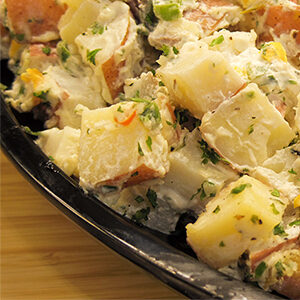
Nontyphoidal Salmonella—It’s Not Just in the Potato Salad…
Summer is upon us, and with it increased outdoor water recreation, exposures to wildlife, BBQs and picnics. Every year, beginning in the spring, we see a rise in enteric pathogenic infections such as Salmonellosis (nontyphoidal Salmonella). To date for 2021, Spokane County has had 14 confirmed cases of Salmonella reported to Spokane Regional Health District. From 2014 to 2018, Spokane County had an average of 39.8 cases per 100,000 of Salmonella per year, with a mean of 40 cases.
Salmonella is characterized by diarrhea, nausea, headache, and sometimes vomiting. Fever is almost always present. Bloody diarrhea and invasive disease may occur, particularly with certain serotypes. Invasive infection may present as urinary tract infection, septicemia, abscess, arthritis, cholecystitis and rarely as endocarditis, pericarditis, meningitis, or pneumonia. A carrier state may develop. The ramifications of an undiagnosed Salmonella infection can be serious; therefore, it is important not to dismiss diarrheal illness as something that will pass, and instead order a Salmonella stool culture.

Fluid and electrolyte replacement (oral or IV) is the mainstay of treatment for persons with salmonellosis. Antibiotic treatment is usually not indicated. Antibiotic therapy may prolong carriage and encourage the appearance of resistant strains; it does not shorten the course or ameliorate the symptoms of non-invasive gastrointestinal infections. Treatment should be reserved for those with invasive disease or those at elevated risk of developing invasive disease (e.g., infants, the elderly, or those with impaired immune functions). If treatment is indicated, antibiotic sensitivities should be determined.
Please help communicate the following information to patients diagnosed with salmonella infection and educate about ways to prevent fecal-oral transmission, including hand washing.
- Exclude cases from sensitive occupations or settings such as daycare attendance or work, food handling, or health care until diarrhea ends; consider requiring two negative stools (24 hours apart and at least 48 hours after antibiotics) before returning to risk settings.
- Recommend no use of public swimming areas until two weeks after diarrhea ends.
- Persons with diarrhea should avoid close contact with immunocompromised persons.
It is important to report these cases within 24 hours of diagnosis to local public health for the following reasons:
- To prevent further transmission from cases
- To identify outbreaks and potential sources of ongoing transmission
- To prevent further transmission from such sources
Commonly recognized vehicles or mechanisms of transmission include the following:
- In cooked or raw meat, poultry, or eggs
- Other foods cross-contaminated with any of the above
- Contaminated produce (e.g., sprouts, cantaloupe, tomatoes)
- Unpasteurized milk or milk products
- Contact with the feces of pets or other infected animals (Salmonella organisms are widely distributed in the animal kingdom, including livestock, pets, wild mammals, poultry and other birds, reptiles, and amphibians. Most infected animals are chronic carriers.)
- Contaminated and inadequately treated drinking water
If you suspect Salmonella, consider making the following recommendations or inquiries into the following practices:
- Wash hands after handling pets, pet wastes, pet treats made from animal products, fowl, other animals, raw meat, raw poultry, and always before food preparation.
- Wash hands after caring for diapered children, after using the toilet, and after handling soiled clothing or linens.
- Do not eat raw eggs or foods containing raw eggs. Do not use dirty or cracked eggs.
- Thoroughly cook eggs, poultry, and other foods of animal origin.
- Avoid cross-contamination of ready-to-eat foods with raw foods of animal origin via cooking surfaces and utensils. Wash food preparation surfaces and utensils thoroughly after contact with raw meat or poultry.
- Wash fruits and vegetables thoroughly before consumption (including melons and all items with a rind or peel that a knife passes through). Peel when possible.
- Avoid unpasteurized milk and other unpasteurized products including soft cheeses, juices, and cider.
- Avoid drinking or swallowing untreated surface water. Untreated water should be boiled or otherwise disinfected before consumption.
- Protect foods from rodent and insect contamination.
- Discourage using chicks, ducklings, turtles, reptiles, or rodents as pets for small children.
- Avoid direct or indirect contact between reptiles and infants or immunocompromised persons.
Washington state Salmonella cases have been associated with the following multistate Salmonella outbreaks:
- Centers for Disease Control and Prevention Salmonella Outbreaks Linked to Backyard Poultry (includes ducks, chickens and turkeys)
- Centers for Disease Control and Prevention Salmonella Outbreak Linked to Wild Songbirds
References
Salmonellosis Reporting and Surveillance Guidelines (Washington State Department of Health January 2017), https://www.doh.wa.gov/Portals/1/Documents/5100/420-035-Guideline-Salmonellosis.pdf#nameddest=casedef.
